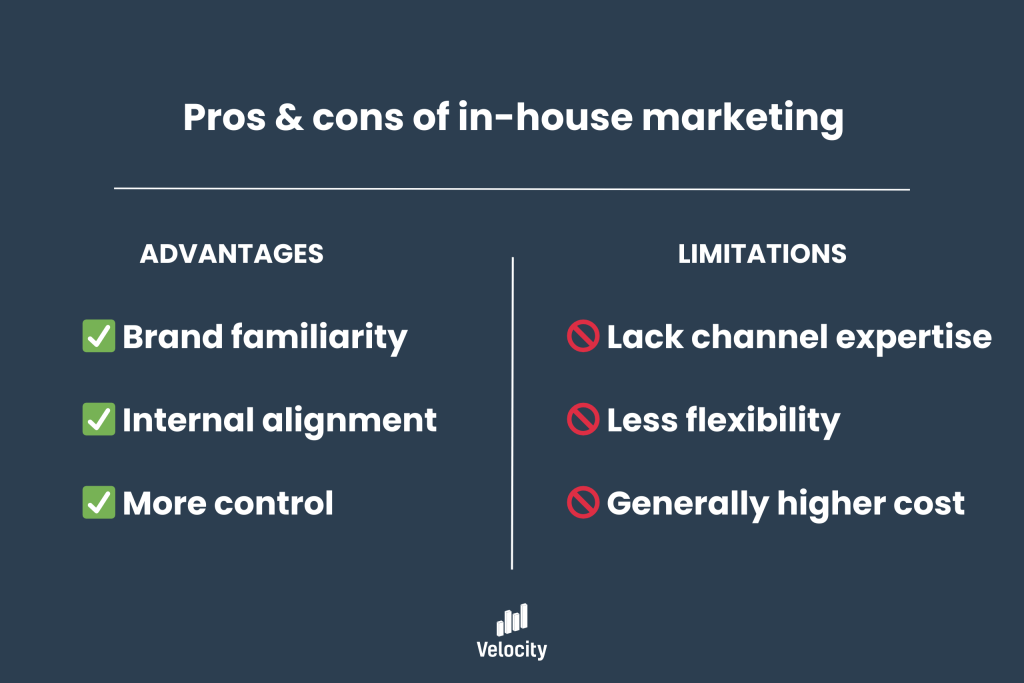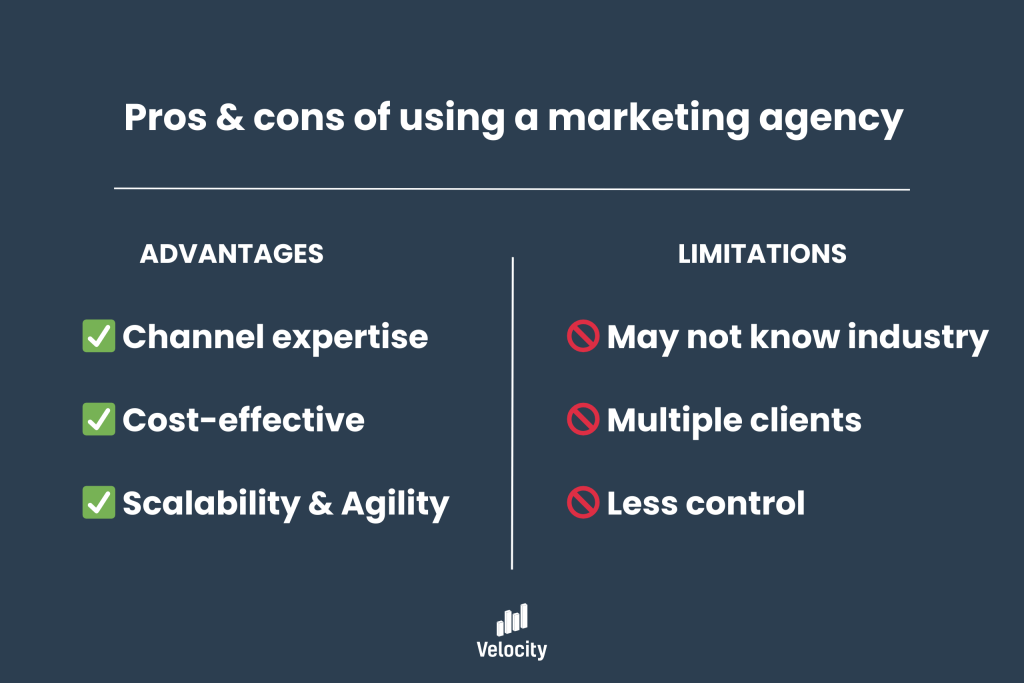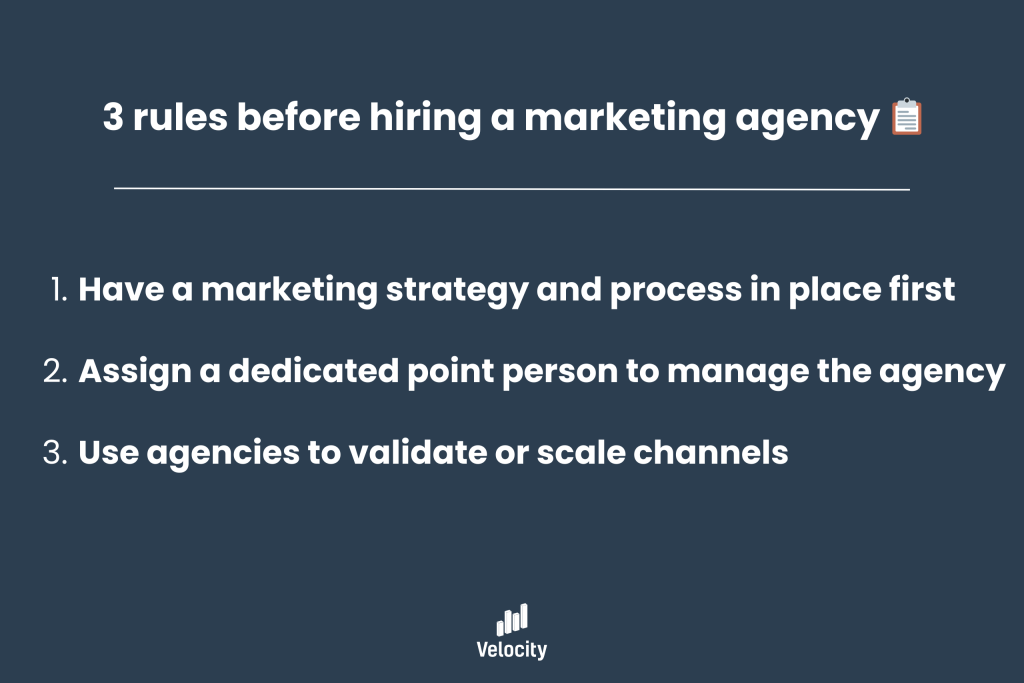In-House Vs Agency Marketing: Pros & Cons + Which Gets Results Faster in 2023

Introduction
In-house vs agency; it’s an all too common dilemma in marketing departments. When it comes to marketing, businesses have two main options: hiring in-house marketers or working with an agency.
Each option has its own advantages and drawbacks, so it’s important to consider the pros and cons before making a decision on what’s best for your business.
Broadly, in-house marketing gives businesses more control over the process, but it can also be costly and time-consuming. On the other hand, an agency allows businesses to outsource their marketing needs and scale faster, but it can be difficult to find the right partner and you might cycle through agencies before finding one that’s right for your requirements and industry.
In this blog post, we will explore the key differences between in-house and agency marketing, so you can make an informed decision about which option is best for your business.
In-house vs. agency pros and cons
In-house marketing pros & cons

Pros of in-house marketing
Familiarity with brand and product/service
In-house marketers usually have a deep understanding of brand. They’re immersed in your brand, day in and day out, which helps them to build familiarity with your product/service offering, industry and understand why customers are choosing your brand over others.
This can translate to marketing activities and campaigns that are better aligned with the interests, values and goals of your company. It can also accelerate time-to-results, because when in-house marketers are spinning up a new campaign, they have deep context on target audiences, product/service features and how to communicate value.
Alignment with other internal functions
While the average marketer doesn’t need to know your firm’s profit margin down to one decimal point, having alignment with and exposure to complementary functions within an organization can help to boost marketing results.
For example, in a sales-led organization, marketing teams should sit closely with sales departments, this will allow them to share learnings with sales on what’s driving leads, while sales teams can share which types of leads are best, and what conversations or pain points commonly re-occurs with prospects.
In a product-led organization, marketers can learn a great deal from product managers, engineering and design teams to anticipate what’s ahead on the roadmap, and why features have been built in the first place.
Better control
With an in-house marketing team, management should have a pretty good handle on what’s being worked on, project risks and most importantly – if something goes wrong, there will be someone on-staff to own the problem and fix it. These factors contribute to greater control of marketing activities, and in turn, marketing outcomes.
You have direct access to the team, so you can control marketing messages, channel efforts and budgets to ensure they are consistent with your company’s goals. With this kind of access – you can also make sure that your team is focused on the go-to-market strategies and tactics that are most likely to produce results for your company.
Cons of in-house marketing
Lack of Channel Expertise
When companies opt for an in-house marketing team, they may lack the expertise and experience of working with different channels. This can limit their ability to create effective campaigns and make the most of the available channels.
On the other hand, agencies often specialize in one or a few channels, meaning they can go far deeper than a generalist team. There are also economies of scale for learning when an agency is working in one channel for multiple clients or industries; they can test different tactics with far larger budgets to get better sample sizes on what works and why.
Lack of flexibility
An in-house team may be limited in its ability to quickly adapt to changes in the market or ramp up quickly on emerging channels. This can reduce their ability to be agile and stay ahead of the competition. With the marketing landscape rapidly changing year-on-year, this can have detrimental effects if your team is using stale tactics or hasn’t kept up to date with professional development.
This could mean that they are behind the curve when it comes to new strategies and may not be able to capitalize on opportunities as quickly as an external agency. In-house also means you generally have to commit to hires for a longer period of time, as in-house staff are typically full-time employees.
Different industries have peaks and troughs in seasonal demand throughout the year. When using an in-house team it’s harder to satisfy increases in demand and busy seasons than with an external partner that can scale up as needed.
Cost
In-house marketing teams typically require a larger budget than outsourced marketing solutions, as you need to cover salaries, benefits, and other overhead costs. This can make it difficult for small businesses and startups to afford an in-house team.
Hiring and firing costs money too. For example, if a Google Ads specialist doesn’t work out, you may have to keep them on staff for longer than you’d like, and there may be severance and other costs if you have to terminate their employment. Similarly with the cost of hiring high and a tight labor market in 2023, finding the right in-house candidates can be an expensive proposition.
Pros & cons of using a marketing agency

Pros of using a marketing agency
Channel, vertical or industry expertise
The best agencies usually aren’t generalists, rather they specialize in a channel, e.g. content, email, paid search etc. or they specialize by industry or vertical, for example they might only serve construction firms, SaaS companies or SMBs.
Hiring a marketing agency that specializes in a certain channel like SEO or PPC can provide you with expertise to get better results. A specialized agency understands the nuances of a particular marketing channel and will be able to execute against a process that has been proven for multiple clients. They’ll know what works through testing, and will have suggestions for how to map your broader business strategy and north star metrics to success on a specific channel.
Specialized agencies are also up-to-date on the latest trends and techniques in their area of expertise, which can give you an edge over your competition. For example, an email marketing firm will have tested thousands of subject lines, so they’ll be able to offer some tried and true recipes to boost your open rates.
Many agencies work closely with channel partners, for example a Google Ads agency will often have a close relationship with Google, and have dedicated reps available, access to new platform betas, best practice recommendations and enhanced technical support.
Cost-effective
Agencies can ramp up a new channel, or augment efforts at a fraction of the cost of a full time hire. If you want to quickly smoke-test whether a new channel, tactic or strategy is going to work for your business, hiring an agency is a great idea.
A lot of agencies don’t require long-term contracts (and if they do – run), so there’s less cost commitment up-front compared to hiring in-house. And once onboarded, you don’t need to worry about paying an agency’s benefits, office space or perks.
One overlooked benefit of working with an agency is that you’ll be able to learn from their process. You’ll see how they approach problems and you can then decide to take channels back in-house or if more efficient keep it outsourced.
Scalability & Agility
Many industries have periods of high and low demand. Retail in particular sees a holiday surge during Q4 (a fun time to be a marketer). Forecasting demand and marketing staff requirements can be tricky, macroeconomic factors come into play and some years are just downright strange for reasons no one anticipated (I’m looking at you Covid).
An agency partner allows you to scale up during busy periods, and reduce scope when things become quieter. While generally there’s a retainer that remains constant, if you need additional scope to increase deliverables, it’s not a challenge. This kind of scalability is impossible with an in-house team, where hiring lead times, onboarding and training make teams far less agile to react to changing market conditions.
Cons of using a marketing agency
May not have industry expertise
As a counterpoint to the benefit listed above of agencies having industry expertise, the flipside of when an agency doesn’t have experience in your niche is that they can get things very, very wrong.
For example, you may hire an agency that’s an expert in D2C acquisition with paid social – they promise you the world, and believe they can do the job. But when it comes down to it, they realize that the strategies and tactics they usually apply just don’t work for your industry. This would be a waste of time and money for both parties.
Another risk is in regulatory-heavy industries, for example medical, alcohol and credit businesses. These sectors need specialized teams that understand the landscape, and how to market sensitive products and services to avoid ad policy violations or even litigation in the worst-case scenario.
Multiple clients
Are you getting the attention you deserve? As a rule of thumb for Google Ads – we don’t recommend an individual to be responsible for more than 5-7 ad accounts at any one time. And again that’s dependent on client spend, if they are spending significantly, it’s far less than that figure.
Many agencies overburden their teams, who are often junior, with too many accounts to manage. This results in low quality work, dropped balls and poor outcomes for both agency and client. That being said this is not the industry norm, and reputable agencies allocate a mix of senior and junior staff on projects, while not overburdening employees with more than they can handle.
Lack of control
When you hire an agency, you are essentially handing over control of your marketing efforts to someone else. This can be difficult if you’re a hands-on business owner who likes to be involved in all aspects of your business.
While the best agencies walk their clients along the process and request approval at multiple stages, there’s always going to be a degree of autonomy from the agency. But that’s often why you’ve hired them in the first place – to get the job done. So this disadvantage is really one for the micromanagers out there. An effective agency that can execute without needing much oversight is a valuable partner that can help you focus on more strategic tasks.
When should you hire a marketing agency instead of in-house marketers?

In general, businesses should consider hiring an agency when they need specialized expertise or a large scale campaign that requires a lot of resources. An agency can bring in a team of experts with a wide range of skills and experience, which can help to get the job done efficiently and effectively. It also allows for more flexibility, since you can hire the agency for a specific project instead of committing to an ongoing contract.
On the other hand, an in-house team has the advantage of being able to provide more consistent and ongoing support. They will be familiar with your company’s mission and products, so they can tailor their strategies to meet your needs. Ultimately, the decision of whether to hire an agency or an in-house team comes down to your business’s needs and budget.
Have a strategy and processes in place first
Don’t hire a marketing agency before you have a well-thought out and documented go-to-market strategy (we highly recommend this guide from Reforge). Otherwise, you may end up deciding that the agency model doesn’t work for your firm, or that the channel doesn’t work, when in fact the issue is that your own strategy is flawed or nonexistent.
Leverage agencies for their expertise, while building the core foundation in-house. Marketing processes need to be robust. Have metrics to evaluate agencies against, goals to work towards and a solid understanding of the levers they can use to get you results, and the mechanics of their work.
If hiring for a specific channel, it can be good to have some traction before hiring an agency to scale it up. Alternatively, hiring a consultant for a pilot program can be a quick way to validate whether it makes sense as a marketing investment.
Have a dedicated point of contact to manage the agency
Stitching together different agencies to create a makeshift marketing department rarely works. It’s best to have at least one, full-time marketer or point of contact on-staff to manage the relationship with the agency, and make sure you get the best value from your investment.
If you’re a time-strapped CEO, managing an agency may not be the most effective use of your time. Delegate this task to an in-house marketer or someone who’s been involved with the marketing planning process.
Which gets results faster in 2023?
When it comes to getting results faster, it depends on the type of marketing being done. If you are doing a short-term campaign or need to quickly reach a large audience, then an experienced marketing agency may be the best option. They will have access to established networks and the resources to execute quickly and efficiently.
On the other hand, if you are looking for a long-term strategy or need to build an in-depth relationship with your target audience, then an in-house marketing team may be the better option. They will have more time to understand your brand, develop creative tactics, and build relationships with your customers. Ultimately, it depends on your individual needs, but both options have their advantages.
Conclusion
As a general rule, when it comes to in-house vs agency, look to agencies for specialist expertise. However, if you’re not confident in your company strategy, product/service offering or market positioning, outsourcing any marketing activity may not be the best use of your time.
When it comes to what to use an agency for – more tactical plays like advertising, SEO and content development are often much better to outsource to an agency, as you can find lots of agencies with deep specialization in these channels.
Stitching together a marketing department using agencies and freelancers may seem cost-effective, but you should consider the second-order effects that come with these cost savings; misalignment across channels, brand inconsistencies and potentially a failure to deliver a comprehensive marketing program.
For most companies, having a marketing generalist in-house to manage agencies is essential, and ideally you should have a small team before working with agencies. Agencies can add momentum and accelerate channel marketing initiatives, but your basic marketing foundation should be in place before you accelerate growth with external teams.